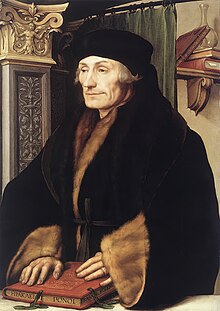எராஸ்மஸ்
| எராஸ்மஸ் | |
|---|---|
 இளைய ஆன்சு கோல்பினால் வரையப்பட்ட எராஸ்மசின் புகைப்படம் (1523) | |
| பிறப்பு | c. 28 அக்டோபர் 1466 ராட்டர்டேம் அல்லது கௌடா, பர்கிண்டிய நெதர்லாந்து |
| இறப்பு | 12 சூலை 1536 (அகவை 69) பேசெல், பழைய சுவிசு குடியரசு |
| மற்ற பெயர்கள் | Desiderius Erasmus Roterodamus, Erasmus of Rotterdam |
| படித்த கல்வி நிறுவனங்கள் | Queens' College, Cambridge Collège de Montaigu, Paris University of Turin |
| காலம் | மெய்யியல் மறுமலர்ச்சி |
| பகுதி | மேற்குலக மெய்யியல் |
| கல்விக்கழகங்கள் | University of Leuven |
முக்கிய ஆர்வங்கள் | கிறித்தவ மெய்யியல் மானுட மறுமலர்ச்சி |
குறிப்பிடத்தக்க எண்ணக்கருக்கள் | ஏராசுமசிய உச்சரிப்பு |
செல்வாக்குச் செலுத்தியோர் | |
செல்வாக்குக்கு உட்பட்டோர் | |
திசிடெரியஸ் எராஸ்மஸ் ரோட்டரோடமஸ் (Desiderius Erasmus Roterodamus)[note 1] (28 October 1466 – 12 July 1536)) இடச்சு தத்துவஞானியும், கத்தோலிக்க இறையியலாளரும் ஆவார். இவர் வடக்கு மறுமலர்ச்சியின் சிறந்த அறிஞர்களில் ஒருவராகக் கருதப்படுகிறார்.[1][2][3] ஒரு கத்தோலிக்க பாதிரியாராக, இவர் ஒரு தூய இலத்தீன் பாணியில் எழுதிய பாரம்பரிய புலமையில் ஒரு முக்கிய நபராக இருந்தார். மனிதநேயவாதிகள் மத்தியில் இவருக்கு " மனிதநேயவாதிகளின் இளவரசர் " என்ற பெயர் இருந்தது. மேலும் " கிறிஸ்தவ மனிதநேயவாதிகளின் மகுடம்" என்றும் அழைக்கப்படுகிறார்.[4] நூல்களில் பணிபுரிய மனிதநேய நுட்பங்களைப் பயன்படுத்தி, புதிய ஏற்பாட்டின் முக்கியமான புதிய இலத்தீன் மற்றும் கிரேக்க பதிப்புகளைத் தயாரித்தார். இது கிறித்தவச் சீர்திருத்த இயக்கம் மற்றும் கத்தோலிக்க மறுமலர்ச்சி ஆகியவற்றில் செல்வாக்கு செலுத்தக்கூடிய கேள்விகளை எழுப்பியது.[5] இவர், ஆன் ஃப்ரீ வில்[5], இன் பிரைஸ் ஆஃப் ஃபோலி, ஹேண்ட்புக் ஆஃப் எ கிறிஸ்டியன் நைட், ஆன் சிவிலிட்டி இன் சில்ட்ரன், கோபியா: ஃபவுண்டேஷன்ஸ் ஆஃப் தி அபண்டண்ட் ஸ்டைல் போன்ற பல படைப்புகளையும் எழுதினார்.
வளர்ந்து வரும் ஐரோப்பிய மத சீர்திருத்தத்தின் பின்னணியில் எராஸ்மஸ் வாழ்ந்தார். இவர் தனது வாழ்நாள் முழுவதும் கத்தோலிக்க திருச்சபையின் உறுப்பினராக இருந்தார். திருச்சபை மற்றும் அதன் மதகுருக்களின் துஷ்பிரயோகங்களை உள்ளிருந்து சீர்திருத்துவதில் உறுதியாக இருந்தார்.[6][7]
ஆரம்ப வாழ்க்கை
[தொகு]எராஸ்மஸ், 1460களின் நடுப்பகுதியில் 28 அக்டோபர் அன்று ராட்டர்டேம் நகரில் பிறந்தார்.[4] இவர் டச்சு மற்றும் லத்தீன் இலக்கியங்களை இயற்றியவர். நூலகங்களைப் படிப்பதற்காகவே சமய துறவியானார். இவர் பாரிஸ் பல்கலைக்கழகம், ஆக்ஸ்போர்டு பல்கலைக்கழக பேராசிரியர்களிடம் கலந்துரையாடி விளக்கம் பெற்றார். தாமஸ் மோர், ஜான் கெலெட் போன்ற மானிட மரபாளர்களுடன் தொடர்புகொண்டவர்.
இறப்பு
[தொகு]தனது உடல்நிலை மோசமடையத் தொடங்கியபோது, அங்கேரியின் ராணி மேரி, அழைப்பின் பேரில் நெதர்லாந்தின் பிரபாண்டிற்குச் செல்ல முடிவு செய்தார். இருப்பினும், 1536 இல் இந்த நடவடிக்கைக்கான தயாரிப்புகளின் போது, இரத்தக்கழிசல் தாக்குதலால் [[பேசல்|பேசலில் திடீரென இறந்தார். நகரின் பாசல் மினிஸ்டர் கல்லறையில் அடக்கம் செய்யப்பட்டார்.[8][9]
படைப்புகள்
[தொகு]மொழிபெயர்ப்பு நூல்கள்
[தொகு]- கிரேக்க மொழியில் எழுதப்பட்ட விவிலியத்தின் புதிய ஏற்பாட்டுக்கு இலத்தீன் மொழியில் உரை விளக்கம் எழுதியுள்ளார்.
- சிசெரோ யூரிபிடஸ், லூசியன், ஆகியோரது நூல்களை மொழிபெயர்த்தார்.
பிற
[தொகு]- இவரது உரையாடல்கள் (Colloquies) புகழ்பெற்றவை
- ஏழு நாட்களில் எழுதி முடித்த மடமையை புகழ்ந்து நூலில் கிறிஸ்துவ துறவிகள், திருச்சபை நீதிபதிகள், போப்பாண்டவர்கள், ஆகியவற்றை மையப்படுத்தி நையாண்டி விளக்கமளித்துள்ளார்.
- கிறிஸ்துவ இளவரசனுக்கான கல்வி என்ற நூலில் போர்களை தவிர்த்தல், சொத்து குவிப்பை விழாக்கள், மடங்களுக்கு பதில் பள்ளிகளை பெருக்கல், பற்றி வலியுறுத்தியுள்ளார்.
- அமைதி பற்றிய முறையீடு என்ற நூலில் போரின் நிறை குறைகளை விவாதித்துளார்.
குறிப்புகள்
[தொகு]- ↑ Erasmus was his baptismal name, given after St. Erasmus of Formiae. Desiderius was an adopted additional name, which he used from 1496. The Roterodamus was a scholarly name meaning "from Rotterdam", though the Latin genitive would be Roterdamensis.
மேற்கோள்கள்
[தொகு]- ↑ Gleason, John B. "The Birth Dates of John Colet and Erasmus of Rotterdam: Fresh Documentary Evidence", Renaissance Quarterly, The University of Chicago Press on behalf of the Renaissance Society of America, Vol. 32, No. 1 (Spring, 1979), pp. 73–76; www.jstor.org
- ↑ Harry Vredeveld, "The Ages of Erasmus and the Year of his Birth", Renaissance Quarterly, Vol. 46, No. 4 (Winter, 1993), pp. 754–809, www.jstor.org
- ↑ Tracy, James D. "Desiderius Erasmus Biography & Facts". Encyclopedia Britannica. Encyclopedia Britannica. பார்க்கப்பட்ட நாள் 29 May 2018.
- ↑ 4.0 4.1 Latourette, Kenneth Scott. A History of Christianity. New York: Harper & Brothers, 1953, p. 661.
- ↑ 5.0 5.1 Written to refute Martin Luther's doctrine of "enslaved will", according to Alister McGrath, Luther believed that only Erasmus, of all his interlocutors, understood and appreciated the locus of his doctrinal emphases and reforms. McGrath, Alister (2012). Iustitia Dei (3rd ed.). 3.4: "Justification in Early Lutheranism": Cambridge University Press. pp. xiv+ 448.
{{cite book}}: CS1 maint: location (link) - ↑ Hoffmann, Manfred (Summer 1989). "Faith and Piety in Erasmus's Thought". Sixteenth Century Journal (Truman State University Press) 20 (2): 241–258. doi:10.2307/2540661.
- ↑ Dixon, C. Scott (2012). Contesting the Reformation. Wiley-Blackwell. p. 60. பன்னாட்டுத் தரப்புத்தக எண் 978-1-4051-1323-6.
Erasmus had been criticizing the Catholic church for years before the reformers emerged, and not just pointing up its failings but questioning many of its basic teachings. He was the author of a series of publications, including a Greek edition of the New Testament (1516), which laid the foundations for a model of Christianity that called for a pared-down, internalized style of religiosity focused on Scripture rather than the elaborate, and incessant, outward rituals of the medieval church. Erasmus was not a forerunner in the sense that he conceived or defended ideas that later made up the substance of the Reformation thought. [...] It is enough that some of his ideas merged with the later Reformation message.
- ↑
 "Desiderius Erasmus". கத்தோலிக்க கலைக்களஞ்சியம் (ஆங்கிலம்). (1913). நியூயார்க்: இராபர்ட் ஆபில்டன் நிறுவனம்.
"Desiderius Erasmus". கத்தோலிக்க கலைக்களஞ்சியம் (ஆங்கிலம்). (1913). நியூயார்க்: இராபர்ட் ஆபில்டன் நிறுவனம்.
- ↑ "He tried to remain in the fold of the old [Roman] Church, after having damaged it seriously, and renounced the [Protestant] Reformation, and to a certain extent even Humanism, after having furthered both with all his strength." Johan Huizinga, Erasmus and the Age of Reformation (tr. F. Hopman and Barbara Flower; New York: Harper and Row, 1924), p. 190.
வெளி இணைப்பகம்
[தொகு]- Desiderius Erasmus entry in the Stanford Encyclopedia of Philosophy
- "Desiderius Erasmus". Internet Encyclopedia of Philosophy.
- குட்டன்பேர்க் திட்டத்தில் எராஸ்மஸ் இன் படைப்புகள்
- ஆக்கங்கள் எராஸ்மஸ் இணைய ஆவணகத்தில்
- Works by எராஸ்மஸ் at LibriVox (public domain audiobooks)

- கணித மரபியல் திட்டத்தில் எராஸ்மஸ்
- Index of Erasmus's Opera Omnia (Latin)
- Opera (Latin Library)
- In Our Time podcast from BBC Radio 4 with Melvyn Bragg, and guests Diarmaid MacCulloch, Eamon Duffy, and Jill Kraye.
- Joseph Sauer: Desiderius Erasmus (Article in the Catholic Encyclopedia, 1909)
- James D. Tracy: Erasmus of the Low Countries, Berkeley – Los Angeles – London: University of California Press 1997
- Desiderius Erasmus: "War is sweet to those who have no experience of it ..." Protest against Violence and War – Online-Exhibition (2017)

